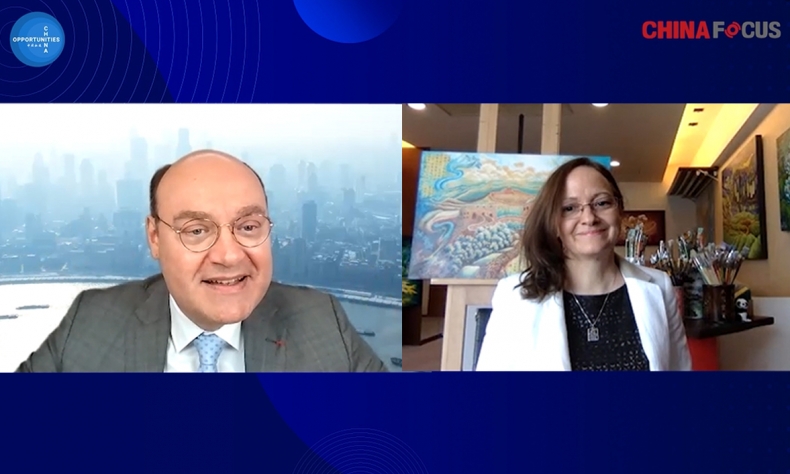
China, a Land of Inspiration for Artists
If you love adventure, China has a lot to offer. It is a big country with sun and snow, with desert and oceans, with the modern and the most historical, and also, my Chinese friends would be upset if I did not mention the vast array of great food.
Editor’s Note: Chinese civilization has a history of 5,000 years. What does this mean to an artist from a western country? David Gosset, the founder of Europe-China Forum, discussed with Annie Pelletier who is a Canadian artist and now lives in Beijing. Annie gets inspiration from Chinese culture and uses her way to create Chinese-themed paintings.
China Opportunities, hosted by Mr. Gosset, is a global dialogue with senior officials, business elites and distinguished people. The serial interviews are coproduced by China Focus and DG2CI Limited in association with Academy of Contemporary China and World Studies.
David Gosset: Artists need inspiration. Where do you get your inspiration in today’s China?
Annie Pelletier: Well, the most fascinating thing about China for me is that in many places, it is very modern, yet is so intricately linked to the ancient China. I don’t think anyone can ever walk away from 5,000 years of history. You know walking on the Great Wall is still very important not only for tourists, but also for Chinese people. You know, there is a saying that goes, a man isn’t a man until he has walked on the Great Wall. Same for the dragons. They still celebrate the Dragon Dance when they have festivities. And also, the moment I landed, I fell in love with the writing. You know, every single Chinese character is a drawing, has a little story. Everywhere I look, everywhere I go, it’s always in my face. So, I feel that the tradition and culture, the legends and stories in China’s everyday life is always present, and that is my greatest inspiration.
David Gosset: Fascinating. I share your passion for the Chinese characters. This is a fantastic source of inspiration, which has been here for millennia actually. Of course, as a foreign artist living and creating in China, you are having a lot of conversation with the Chinese artists. How is the dialogue? Is it a fruitful dialogue, Annie, for you?
Annie Pelletier: Well, yes. I took a few classes of calligraphy and traditional Chinese art, and Chinese artists are welcoming and eager to share their knowledge. But in general, I think they are more intrigued by my work, because I paint their dragons, their Great Wall, their lotus flowers, and their calligraphy in my own western style. So, it makes an interesting blend. And honestly, I think that the response is very positive. But I can’t wait to speak mandarin to be able to truly exchange with Chinese artists. We also are privileged, however, because the artist, like they say, a picture is worth a thousand words. So, when it’s time to communicate, the audience has a visual reference, and that really helps the communication.
David Gosset: Thank you. Your story, of course, is a very rich story. But at the moment, you are a Canadian painter living and working in China. Would you recommend artists across the world to come to spend time in China, in order to be inspired by the Chinese tradition or the changes which are at working in today’s China?
Annie Pelletier: Yes, of course. If you love adventure, China has a lot to offer. It is a big country with sun and snow, with desert and oceans, with the modern and the most historical, and also, my Chinese friends would be upset if I did not mention the vast array of great food. That being said, if you speak mandarin, your exchange will be so much more fruitful. Because too often, we lose the essence of the conversation and part of the real feelings when your message has to be translated.
David Gosset: It’s very important to talk about the Chinese economy. This is a very powerful change for the Chinese people and for the world. But I think we should not forget that what is also going on in China at the moment. It is intellectual and cultural renaissance, and this is a huge opportunity for the Chinese people, for the Chinese artists, but also for the foreign artists. So, it was wonderful to have this conversation with you today, Annie, and thank you to be a part of this era of Chinese opportunities.
Annie Pelletier: Thank you, David.
 Facebook
Facebook
 Twitter
Twitter
 Linkedin
Linkedin
 Google +
Google +










